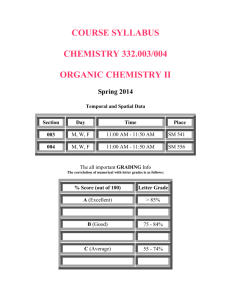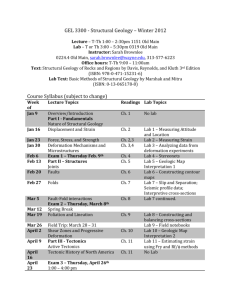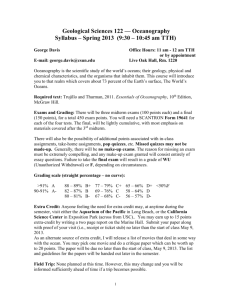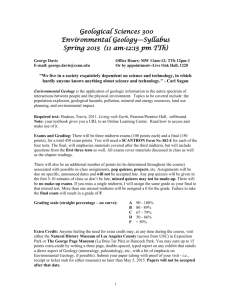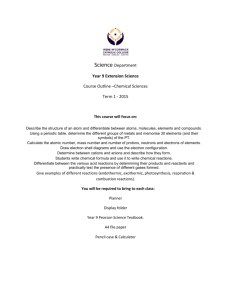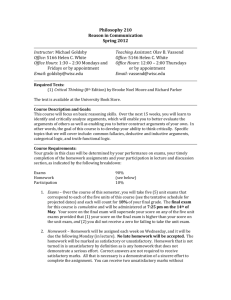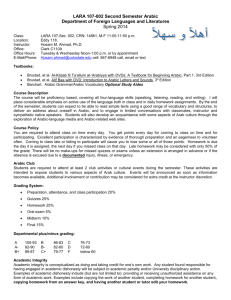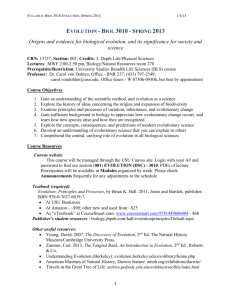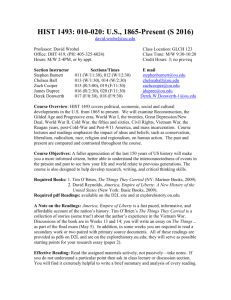Neuroscience 0081: Section 12852
advertisement
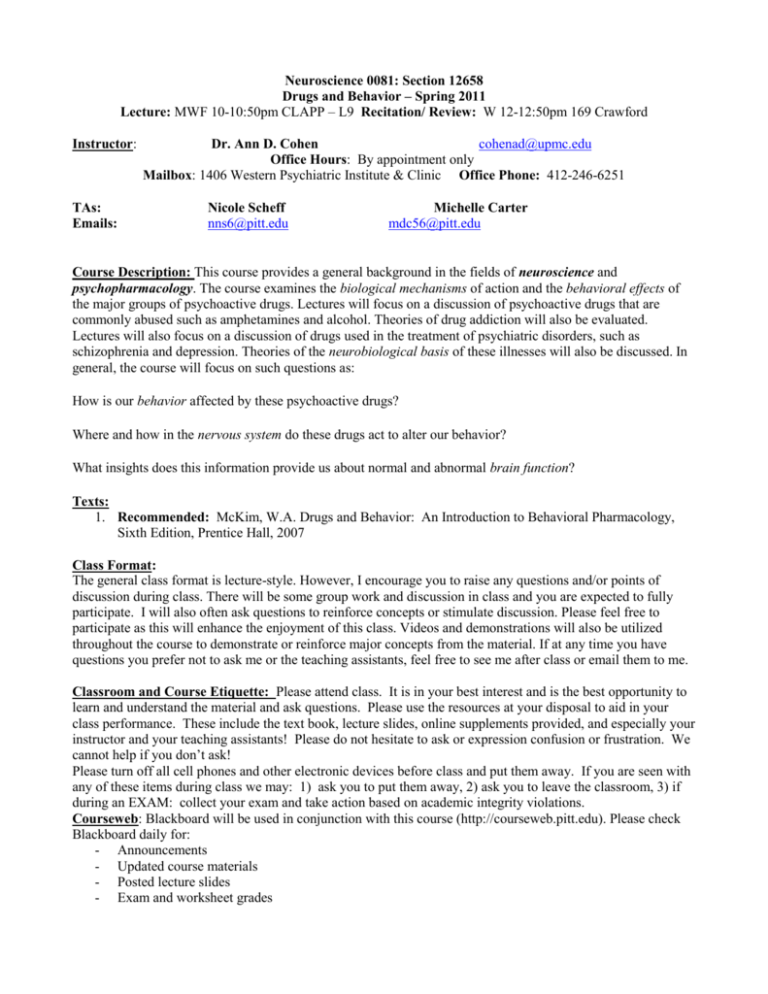
Neuroscience 0081: Section 12658 Drugs and Behavior – Spring 2011 Lecture: MWF 10-10:50pm CLAPP – L9 Recitation/ Review: W 12-12:50pm 169 Crawford Instructor: TAs: Emails: Dr. Ann D. Cohen cohenad@upmc.edu Office Hours: By appointment only Mailbox: 1406 Western Psychiatric Institute & Clinic Office Phone: 412-246-6251 Nicole Scheff nns6@pitt.edu Michelle Carter mdc56@pitt.edu Course Description: This course provides a general background in the fields of neuroscience and psychopharmacology. The course examines the biological mechanisms of action and the behavioral effects of the major groups of psychoactive drugs. Lectures will focus on a discussion of psychoactive drugs that are commonly abused such as amphetamines and alcohol. Theories of drug addiction will also be evaluated. Lectures will also focus on a discussion of drugs used in the treatment of psychiatric disorders, such as schizophrenia and depression. Theories of the neurobiological basis of these illnesses will also be discussed. In general, the course will focus on such questions as: How is our behavior affected by these psychoactive drugs? Where and how in the nervous system do these drugs act to alter our behavior? What insights does this information provide us about normal and abnormal brain function? Texts: 1. Recommended: McKim, W.A. Drugs and Behavior: An Introduction to Behavioral Pharmacology, Sixth Edition, Prentice Hall, 2007 Class Format: The general class format is lecture-style. However, I encourage you to raise any questions and/or points of discussion during class. There will be some group work and discussion in class and you are expected to fully participate. I will also often ask questions to reinforce concepts or stimulate discussion. Please feel free to participate as this will enhance the enjoyment of this class. Videos and demonstrations will also be utilized throughout the course to demonstrate or reinforce major concepts from the material. If at any time you have questions you prefer not to ask me or the teaching assistants, feel free to see me after class or email them to me. Classroom and Course Etiquette: Please attend class. It is in your best interest and is the best opportunity to learn and understand the material and ask questions. Please use the resources at your disposal to aid in your class performance. These include the text book, lecture slides, online supplements provided, and especially your instructor and your teaching assistants! Please do not hesitate to ask or expression confusion or frustration. We cannot help if you don’t ask! Please turn off all cell phones and other electronic devices before class and put them away. If you are seen with any of these items during class we may: 1) ask you to put them away, 2) ask you to leave the classroom, 3) if during an EXAM: collect your exam and take action based on academic integrity violations. Courseweb: Blackboard will be used in conjunction with this course (http://courseweb.pitt.edu). Please check Blackboard daily for: - Announcements - Updated course materials - Posted lecture slides - Exam and worksheet grades Grading: 1. Exams a. b. c. d. e. f. There are a total of 5 exams given for this course The lowest exam grade will be dropped (this CANNOT be the final) Make-up exams will not be allowed A total of 4 exams will = 80% of the final grade Exams are all objective The final exam is NOT cumulative 2. Worksheets: a. Worksheets will be given throughout class (10 total, 8 will count for grading)- they will be open book/notes and can be completed in groups- worth 20% of the final grade. b. There are absolutely no make-ups for worksheets- NO EXCEPTIONS. Two will be droppedso you can miss 2 classes/worksheets without penalty. 3. Calculation: a. (4 HIGHEST EXAM SCORES + 8 HIGHEST QUIZ SCORES) / 500 = final percentage Grading Scale Letter Grade A+ A AB+ B B- Percentage Range 98-100 93-97 90-92 88-89 82-87 80-81 Letter Grade C+ C CD F Percentage Range 78-79 72-77 70-71 60-69 Below 60 Academic integrity: Please see the College of Arts and Sciences web page for details on academic integrity www.pitt.edu Disabilities and Special Needs: If you have a disability for which you are or may be requesting an accommodation, you are encouraged to contact both your instructor and Disability Resources and Services, 216 William Pitt Union, 412-6487890 or 412-383-7355 (TTY) as early as possible in the term. Please go to the Student Affairs website at http://www.drs.pitt.edu/ for more information. Recitation/ Review: Recitation may not be held every single week. This will be up to the discretion of the instructor and you will be informed in advance. However, there will be office hours provided by all teaching assistants and the instructor at a minimum of 4 hours per week. Review/Summary of lecture material Question/Answer with the Teaching Assistants Useful for: studying, clarifying concepts, etc DATE TOPIC Jan 5 NO CLASS Jan 7 NO CLASS Jan 10 Outline/Syllabus READING n/a 1: What Drugs and What Behaviors? Jan 12 2: Drug Actions in the Body: ADME Jan 14 NO CLASS Jan 17 NO CLASS- MLK DAY Jan 19 3: Drug Actions in the Body: Dose Response Curves p. 1-2 p. 3-6 REVIEW Jan 21 4: Neuroanatomy, Cells of Nervous System p. 6-23 Jan 24 5: Neural communication: Resting Potential p. 57-60, 72-80 Jan 26 6: Neural communication: Action Potentials p. 60-62 REVIEW Jan 28 EXAM I Jan 31 7: Synaptic Transmission p. 62-68 Feb 2 8: Neurotransmitters p. 68-72 Feb 4 9: Neurobiology of Reinforcement and Tolerance n/a Feb 7 10: Neurobiology of Dependence and Withdrawal p. 42-44, 48-52 Feb 9 11: Depressants: Alcohol p. 45-48 REVIEW Feb 11 12: Depressants: Benzodiazepines/Barbiturates p. 128-159 Feb 14 EXAM II p. 161-177 Feb 16 13: Stimulants: Cocaine p. 179-197 Feb 18 14: Stimulants: Amphetamine, Methamphetamine n/a Feb 21 15: Stimultants: Caffeine p. 241-259 Feb 23 16: Stimulants: Nicotine p. 241-259 REVIEW Feb 25 17: Marijuana p. 220-239 Feb 28 18: Marijuana p. 198-218 Mar 2 19: Narcotics: Opiates and Pain p. 313-335 REVIEW Mar 4 Mar 7-11 20: Narcotics: Opiates and Pain p. 313-335 NO CLASS, Spring Break Mar 14 EXAM III Mar 16 21: Hallucinogens: Serotonergic p. 261-281 Mar 18 22: Hallucinogens: Ecstasy, NMDA Antagonists n/a Mar 21 23: What Is Addiction? p. 336-347 Mar 23 24: Studying Drugs and Behavior in Animals p. 348-354 REVIEW Mar 25 25: Studying Drugs and Behavior in Humans p. 91-95 Mar 28 26: Treatment of Addiction n/a Mar 30 27: Treatment of Addiction n/a REVIEW Apr 1 EXAM IV n/a Apr 4 Affective Disorders: Schizophrenia n/a Apr 6 Affective Disorders: Schizophrenia n/a Apr 8 Affective Disorders: ADHD n/a Apr 11 Neurodegenerative Disease: Parkinson’s Disease p. 283-295 Apr 13 Neurodegenerative Disease: Parkinson’s Disease p. 283-295 REVIEW Apr 15 Neurodegenerative Disease: Alzheimer’s n/a Apr 18 Affective Disorders: Depression n/a Apr 20 Affective Disorders: Anxiety n/a Apr 22 Wrap-up n/a REVIEW TBA Exam V – Final (NOT CUMULATIVE, CANNOT BE DROPPED)

